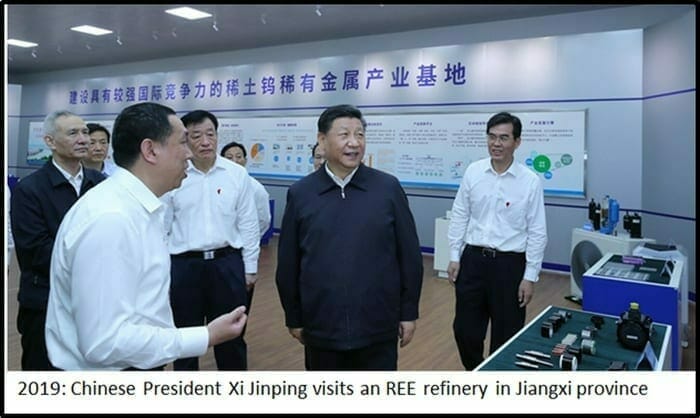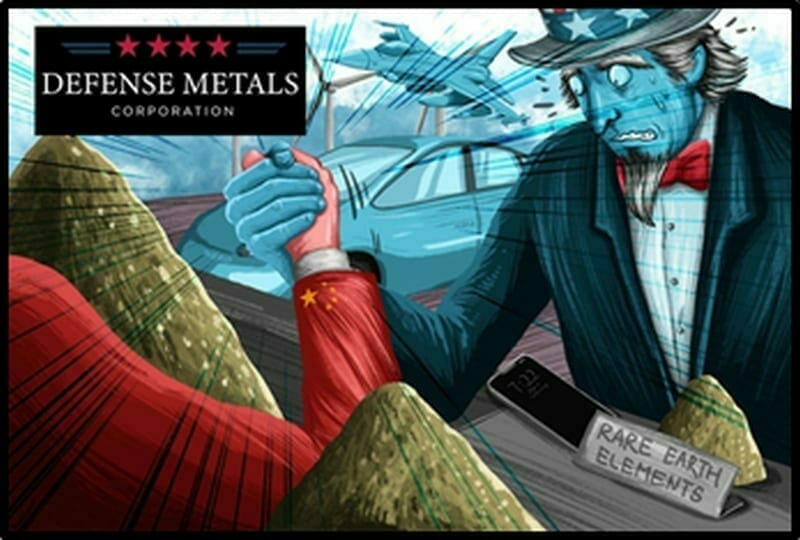If you owed someone a bucket of money and were also dependent on them for personal protection – you might think twice before antagonising them.
Attempting to distract the U.S. electorate from a grossly mis-handled pandemic – the Trump https://equity.guru/wp-content/uploads/2021/10/tnw8sVO3j-2.pngistration has chosen this moment to “get tough with China”.
This – despite the fact that the U.S. owes China $1 trillion dollars and is reliant on China for “Rare Earth Elements” (REEs) – required for military applications such as jet engines, antimissile defence systems, satellites and lasers.
“REEs are crucial for high-tech manufacturing,” confirms The Verge, “These elements are produced mostly in China, and used in the US for everything from electric cars to missiles”.
The U.S. currently gets 77% of its REEs from China.
Last Friday – belatedly sensing its supply chain vulnerability – the US House of Representatives launched a bipartisan caucus aiming to increase domestic production of REEs.
“The Critical Materials Caucus, is the latest effort by officials in Washington to blunt China’s prowess as the world’s largest producer or processor of rare earths, lithium, titanium and other niche but important minerals,” reported Mining.com.
“As US-China relations hit new lows, Washington is redoubling efforts to address a major Achilles’ heel: its dependence on Beijing for rare earth elements – essential materials in various hi-tech products from smartphones and electric car batteries to Javelin missiles and F-35 fighter aircraft,” confirms The South China Morning Post.
The U.S objective to de-couple from the China supply chain creates a strong tailwind for North American REE companies like Defense Metals (DEFN.V) which recently announced the filing of an updated 43-101 technical report on the 4,220 acre Wicheeda Rare Earth Element (REE) Property located near Prince George, British Columbia.

43-101 Technical Report Highlights:
- 49% increase in overall tonnage of Updated Wicheeda REE Project Mineral Resource Estimate (MRE) based on the results of 2019 diamond drilling of 13 holes totaling 2,007.5 metres;
- 30% increase in overall average grade, in part though the incorporation of potentially economically significant praseodymium not previously estimated;
- Conversion of 4,890,000 tonnes to Indicated Resources previously defined as Inferred;
- Increased Inferred Resources by 730,000 tonnes in comparison to Defense Metals Initial Wicheeda MRE; and
- Potential for expansion of the Wicheeda Deposit to the north and west in the down plunge direction.
The updated Wicheeda MRE comprises an Indicated Mineral Resource of 4,890,000 tonnes averaging 3.02% LREO (Light Rare Earth Oxide), in addition to Inferred Mineral Resource of 12,100,000 tonnes averaging 2.90% LREO reported at a cut-off grade of 1.5% LREE.
“Defense Metals’ focus in 2020 will be to complete development of the Wicheeda deposit hydrometallurgical flowsheet, initiate flotation pilot plant processing of the recently collected 30-tonne bulk sample and update the Wicheeda REE deposit mineral resource based on its highly successful 2019 drill campaign,” wrote Equity Guru’s Chris Parry on February 4, 2020.
“A lot of mining explorers don’t actually do much exploring, for fear that they may ruin a good story or get to the end of their CEO salary budget before they have to,” continued Parry, “Defense Metals has been doing the work, finding the good stuff, and doing so at a time when it really matters”.

“REEs - often referred to as the ‘Vitamins of Chemistry’ – are everywhere,” explained Equity Guru’s Greg Nolan.”
“But there are concerns here in the West regarding supply, and it’s not exaggerated. China controls the lion’s share of the current global REE supply,” continued Nolan, “There’s no replacing REEs. Their properties are so unique—so unequaled—we’d be right-screwed if Xi Jinping were to suddenly slap a ban on exports.”
One of the reasons the U.S. – and other countries – were so happy to leave REE mining to China – is that the process creates environmental challenges.
“As China began to produce more smartphones, wind turbines, electric vehicles, and other high-tech products requiring rare earth elements, the mining intensified,” reported Yale Environment 360, “But the removal of these elements [REEs] from the earth’s crust, using a mix of water and chemicals, caused extensive water and soil pollution”.
For this reason, investors in North American REE projects should pay close attention to the company’s environmental engineering.
Two weeks ago, Defense Metals announced that is has begun the initiation of a baseline surface water assessment on the Wicheeda Rare Earth Element (REE) Project.
“To evaluate potential mine effects on surface water quantity a total of eight hydrology stations are recommended within the Wicheeda REE Deposit study area,” stated DEFN, “Discharge data from these locations is collected over a two-year period to determine baseline conditions.”
Equity Guru’s mining wizard Greg Nolan dug into the July 8, 2020 DEFN news, and gave a detailed geological and metallurgical update on DEFN’s project.
Meanwhile, China hiked its mining quota for rare earth minerals by 6.1% in 2020 to a record annual high.

“When outright blaming China for the pandemic proved to be a dud, the US government decided to ratchet up tensions in other ways,” reported the state-controlled, China Daily on July 25, 2020, “booting out Chinese journalists through arbitrary quotas, restricting visas for Chinese researchers, heightening its attacks on Chinese tech companies and applying broad, punitive sanctions over bogus ‘human rights’ concerns”.
The Chinese Consulate-General in Houston, Texas has been informed by the US State Department it must close in a matter of days, with no warning and no reason given aside from a specious list of evidence-free accusations.
In retaliation, China is shuttering the U.S. embassy in Chengdu.
These shifting political winds are favorable to Defense Metals, which has a tiny market cap of $7.5 million.
- Lukas Kane
Full Disclosure: Defense Metals is an Equity Guru marketing client.


Leave a Reply